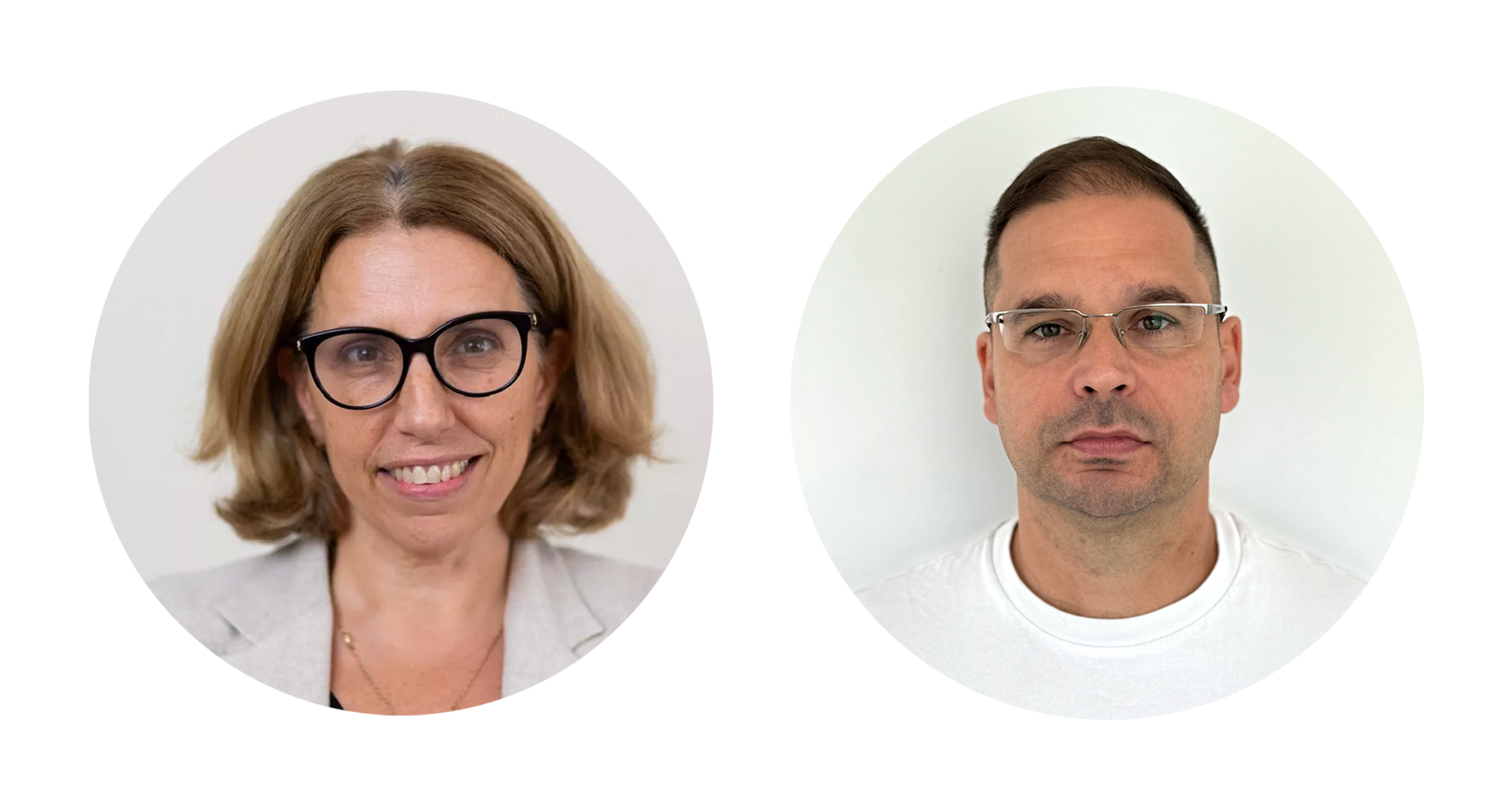
Sep 23, 2024
We are delighted to let you know that the General Assembly in June elected Hariklia Proios as our President for a second term. Hrvoje Jurlina was elected as our new Vice President. Congratulations!
Read what their ambitions are for the coming years.
Hariklia Proios, SAFE President
What is your background?
I’ve spent the last 25 years of my life working to support people affected by stroke, something that has taken me across both the U.S. and Europe. My background is in speech-language, and I am a professor at the University of Macedonia and recently I am also at the CSD department at Adelphi University in New York.
The most rewarding part has been creating and running support groups wherever I go. It’s been such a privilege to work with people from all walks of life, helping them navigate the challenges that come with life after a stroke. I’ve also had the honour of serving as President of SAFE for the past three years. Working with our incredible team to advocate for stroke survivors has been a really rewarding experience.
What is your vision for the future of SAFE?
Looking ahead, my vision for SAFE is simple: I want to keep fighting for stroke survivors. My goal is to ensure that no matter where they live or what resources they have, every stroke survivor gets the care, support and respect they deserve. The disparities in stroke care across different European countries are heartbreaking – some places provide incredible support, while in others, people are left to navigate recovery on their own. That’s something I’m determined to work to change.
We have already made great strides towards this with our work on the Stroke Action Plan for Europe and our Life After Stroke Forum. In the next chapter, we need to build on this work with our member stroke support organisations, working together to deliver campaigns, advocacy, research and raising awareness.
Hrvoje Jurlina, SAFE Vice President
What is your background?
I am a doctor of Family Medicine at a Community Health Centre in Zagreb. My professional journey took a profound turn ten years ago when, at the age of 39, I experienced a stroke at work. That moment became a catalyst for my commitment to improving the needs of stroke survivors, as well as the needs of their families and caregivers.
Five years later, my father suffered a massive stroke and I became his primary caregiver until his passing ten months later. This experience reshaped my perspective on stroke, not just as a survivor, but as someone who intimately understands the emotional, physical and logistical challenges faced by caregivers.
I was recently appointed as Vice President of SAFE and serve as Second Vice President of the Croatian Stroke Society. These roles allow me to merge my personal experiences with my professional expertise, offering a unique, three-dimensional perspective on stroke care and advocacy.
What is your vision for the future of SAFE?
My vision for the future of SAFE is to continue being the strong voice for stroke survivors, advocating for improvements within healthcare systems to ensure comprehensive recovery. We aim to educate about care options and empower stroke survivors and their families by advocating for their rights. SAFE holds a unique position with our ability to unite all the key players, healthcare providers, social services, patient advocate groups, and the families of stroke survivors, into a coordinated and collaborative approach to post-stroke care. I believe that with continued advocacy and collaboration, we can create a healthcare environment that supports stroke survivors through every stage of recovery, offering them not just survival, but a meaningful quality of life.
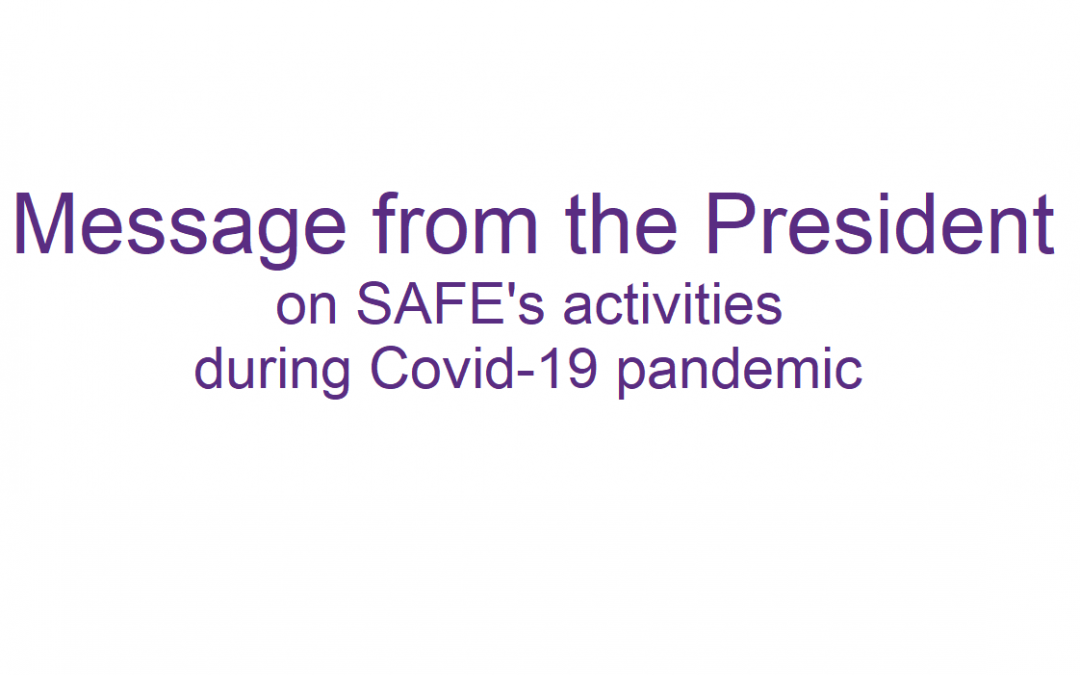
Oct 21, 2020
Dear Friends,
We are in very difficult times. We have never seen a pandemic like this affecting our everyday lives. I hope you and your loved ones are safe and well. We want to let you know that SAFE is here for you and continuing to work despite all the problems around.
While COVID 19 is at the forefront of our thinking, stroke still exists. We know that many of you will be at the front line of services and will be seeing the impact of COVID on individuals who have suffered from stroke. We want to hear from you, we want to know what is happening to stroke survivors in your country, we want to know what is happening to your stroke support organisations and we want to know your ideas as to how we can help.
In addition to finding out how COVID 19 is affecting you and your country, SAFE has adapted its work for 2020. Unfortunately, we have not been able to meet with our members through our usual regional meetings, but we have managed to been up, virtually, June and we will again in November. We have delayed the launch of our economic burden of stroke report until November year. The SAFE General Assembly will be held in November this year and we will do this virtually as we are not able to gather you together for a face to face meeting. I am also excited to let you know that that our first European life after stroke forum is going virtual! The date of 12 March 2021 remains the same and we will share more information with you over the coming months. We will fund one representative from your SSO, and one therapist or nurse from your country. The conference will also be open generally to delegates interested in improving life after stroke services. More information, please click here.
What is happening in the world is a lot for everyone to take in just now, and everyone is having to rapidly adapt their lives on a daily basis. I would like to thank all of you for all the exceptional work you are doing. Please continue to keep well and be safe, do what you can to ensure the survival and sustainability of your stroke support organisation, and we hope to hear from you soon.
With best wishes,
Jon Barrick
President
On behalf of the Board of SAFE
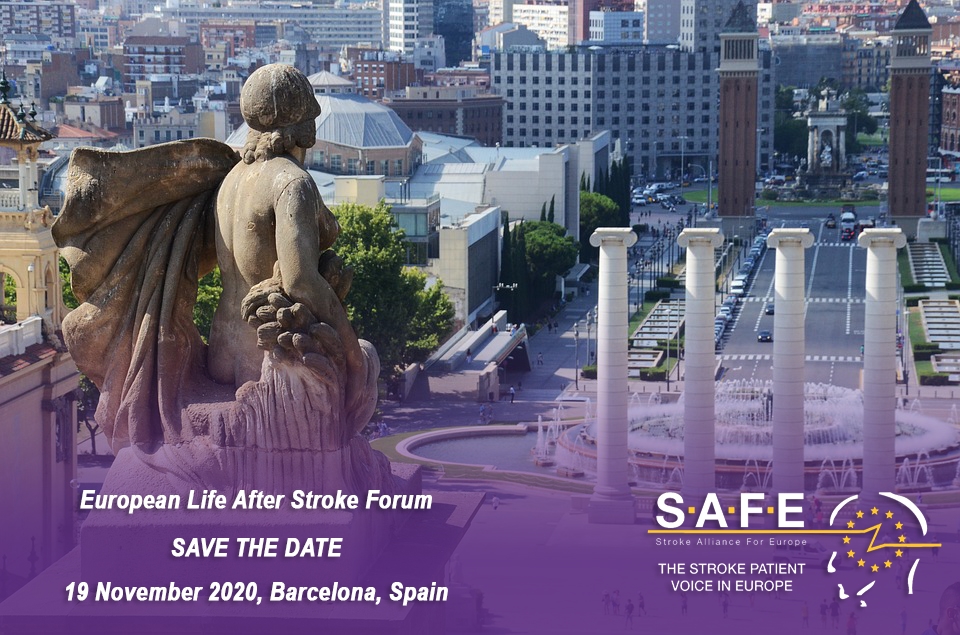
Feb 20, 2020
Life after stroke is a key priority within SAFE’s strategy. It is our pleasure to share with you the date of the first European Life After Stroke Forum – the 19 November 2020 in Barcelona, Spain.
This first European Life After Stroke Forum is driven by the need to implement the Stroke Action Plan for Europe and to create a network of stakeholders involved in professionally researching, advocating and providing evidence for improved life after stroke care.
SAVE THE DATE – EUROPEAN LIFE AFTER STROKE FORUM, 19 NOVEMBER 2020, BARCELONA, SPAIN
We hope we could get you to support the European Life After Stroke Forum by sharing this information with people you know.
When? 19 November 2020
Where? Hotel Catalonia Barcelona Plaza, Barcelona, Spain
Who can attend? Organisations and individuals who operate in the life after stroke area and are research, policy, advocacy or support oriented.
How to register? The registration link will be available soon. Stay tuned!
Please put this date in your calendar and stay tuned for more information that will follow.
We hope to welcome you to Barcelona,
SAFE team
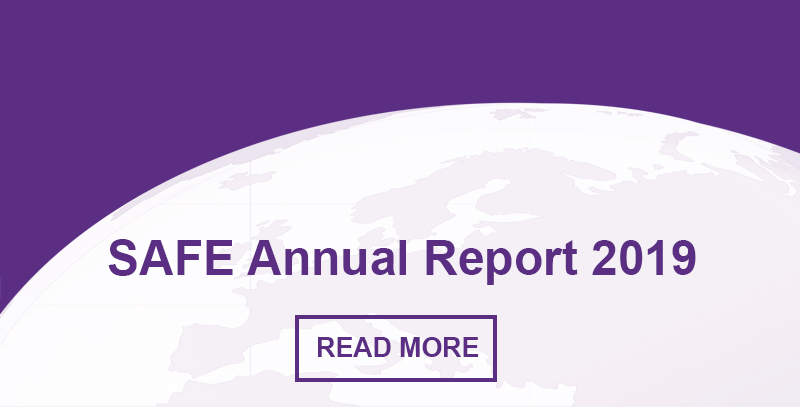
Jan 5, 2020
You can access and download the SAFE Annual Report by clicking on this button below
SAFE Annual Report 2019
In addition, please see below the message of the President of SAFE, Jon Barrick:
This has been a busy and exciting year for our organisation, especially in terms of advocating on pan-European level. We have continued work around the Stroke Action Plan for Europe, forming an implementation committee with the European Stroke Organisation. We held a seminal event at the EU Parliament raising the profile of stroke more than ever before, engaging with the Deputy Director General of the EU’s DG Sante and the EU Committee of the Regions. Through our funding of Oxford University’s project on the economic impact of stroke, we have produced up to date and compelling evidence about the cost of stroke in Europe. With all this accomplished, we continue to press ahead, as we have now completed the third and final year of the research which will provide us with vital European and country specific data on the future economic impact of stroke and power of interventions. The Economic Impact of Stroke in Europe report will be launched in full at the Joint World Stroke Organisation/European Stroke Organisation conference in Vienna in May 2020.
We have continued with the Angels project to produce vital information booklets on stroke to distribute to patients and families while in hospital. We have provided this information in 15 different languages to ensure that more people across Europe can use our materials to improve the lives of stroke survivors.
We continue our educational work with those who wish to understand stroke support organisations and become advocates for better care through our online teaching and learning tool SSOFT, and our regional and working conferences. A particular highlight for me in 2019 was the concrete evidence of the value of our partnership orientation, our Industry partners have been very supportive again, our outreach to ESO has been reciprocated, and we continue to see the number of SSO’s grow, and then become members of SAFE. Yet again we go into a new year with record membership which bodes well for the future.
As SAFE goes from strength to strength in activities to reduce the number and effects of strokes, the Board must also ensure the long-term sustainability of SAFE. The Board has achieved much of its work through dedicated voluntary time but has recognised that this needs to be added to by full
time paid staff. The Board agreed that SAFE required more permanent leadership to drive forward and to achieve our goals. I am delighted to let you know that we recruited our first Director General this year and I know you will all join me in welcoming Arlene Wilkie into the SAFE family.
In 2019, we have been able to deliver many significant achievements because of our close working community. I would like to thank those that have worked with and for SAFE this year, and to the members and sponsors who have supported us practically and financially. This next year is my last as President and I am looking forward to ensuring we have a solid 2020 of achievement to strengthen the long-term sustainability of all stroke support organisations in Europe.
Jon Barrick
SAFE President

Aug 23, 2019
SAFE is very pleased to announce the new Director General, Arlene Wilkie, commenced in post on the 12th August, leading and overseeing the delivery of all SAFE activity and projects, working with our existing experienced team of Jelena Misita, Communications Manager, Gary Randall, SAFE European Research Officer, Lucinda Shaw, Partnerships Manager and Sandra Jackson, Secretariat.
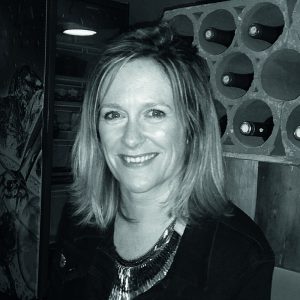
Arlene Wilkie, SAFE Director General
Arlene Wilkie, the new Director General, comes with a wealth of experience and expertise, derived from a variety of organisations and roles over the last twenty years in the healthcare sector, primarily in patient focused organisations. These include Director of Research and Policy at Breast Cancer Campaign, Chief Executive of the Neurological Alliance (a membership organisation of 70 neurological organisations in England), Chief Executive of The Migraine Trust, and Interim Director of Services and Influencing at the Brain Tumour Charity UK.
“I am so pleased to have joined SAFE. In the brief time I have been within here I have been so impressed by the passion of the staff and the board, and their determination to see a reduction in the number of strokes in Europe and the impact they have on peoples lives. I will strive to raise the profile of stroke and stroke survivors and ensure all is done to achieve the stroke action plan for Europe. I am also really looking forward to getting to know and working with all our supporters and members.” said Arlene.
One of Arlene’s great strengths is alliance building, particularly around policy development and implementation, and in her role she will be co-chairing the implementation committee of the Stroke Action Plan for Europe, and playing a leading role in our partnership group. Arlene can be contacted at arlene.wilkie@safestroke.eu
“SAFE has been through a very thorough recruitment process, and from over 130 initial candidates we are thrilled that Arlene has agreed to join us. Her track record is very impressive and over the next few years with the need to ensure sustainability of SAFE whilst pursuing important objectives such as the Stroke Action Plan for Europe and the strengthening of stroke associations in each country of Europe we know we will benefit from her leadership. The appointment of a Director General is a bold step and demonstrates SAFE’s belief that stroke care and the needs of stroke survivors must be pushed higher up the agenda.” stressed Jon Barrick, SAFE President.

Feb 13, 2018
Written by Sarah Belson, published on worldstrokeorganization.blogspot.com
We want to make sure that the voices of people affected by stroke are heard throughout the Congress in an exhibition of stroke survivor, family and caregiver testimonials.
The 11th World Stroke Congress will focus on the latest developments in stroke prevention, acute management and restorative care after stroke. Reducing the burden of stroke on people with lived experience and their family and care givers drives everything the World Stroke Organization does.
In previous years the visibility of people with lived experience of stroke has been promoted through art exhibitions, both physical and online, and a hobbies ebook. (more…)
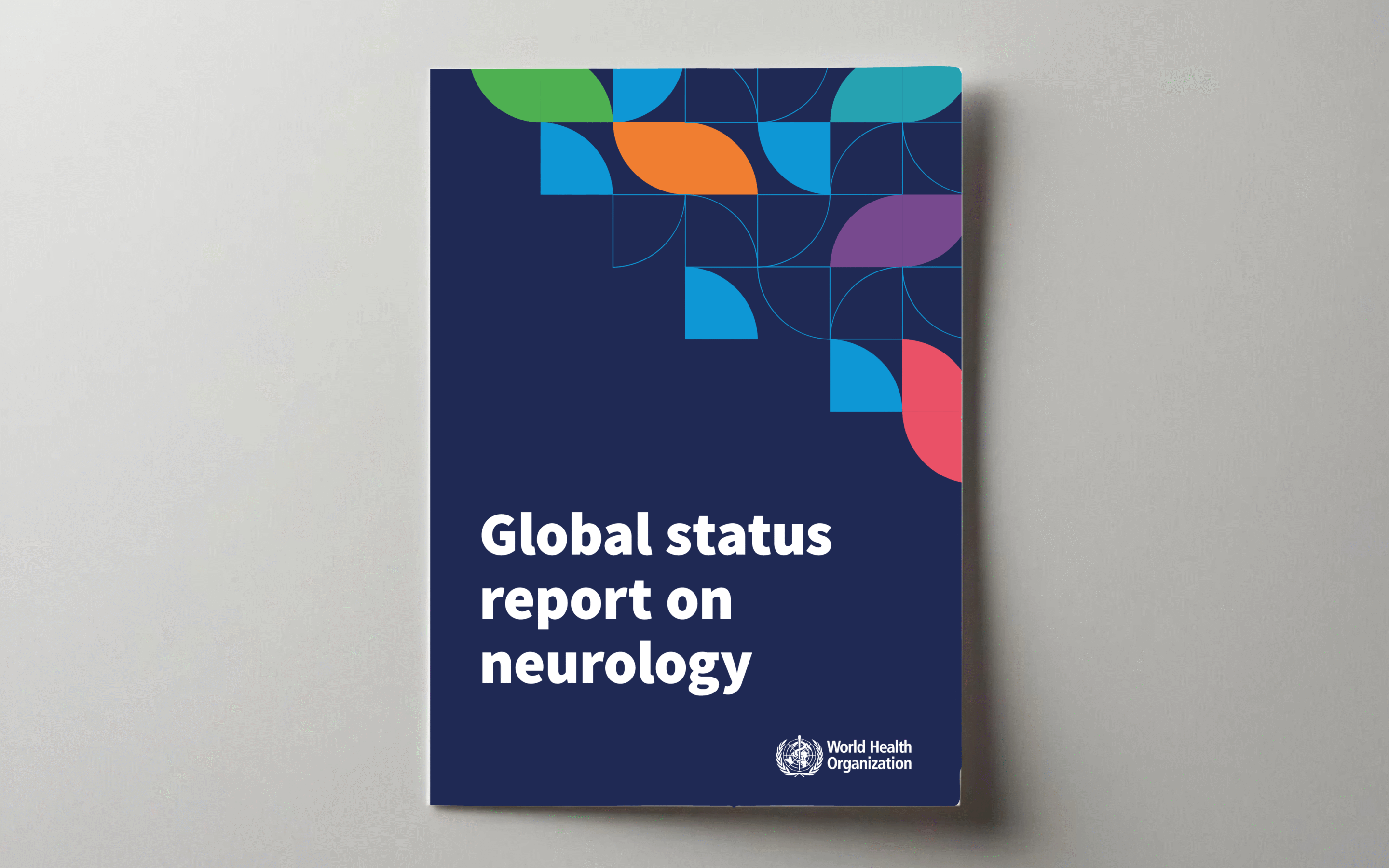
Oct 16, 2025
This week, the World Health Organization (WHO) published its latest Global Status Report on Neurology, revealing that stroke is the leading neurological disorder contributing to health loss worldwide.
In addition, the report outlines the direct costs of 24 brain disorders, including neurological and mental health conditions, exceeded US$ 1.7 trillion, growing by 3.5% annually since 2000. Stroke and dementia account for a large share of this burden. These figures exclude indirect costs such as lost productivity and informal care, which are likely to be substantial.
Despite these figures, stroke care remains fragmented and under-resourced across prevention, acute treatment, rehabilitation and long-term support. We need urgent coordinated action to address this gap.
The Stroke Action Plan for Europe (2018-2030), developed by SAFE and the European Stroke Organisation, provides an evidence-based framework and recommendations for countries to improve their stroke prevention, treatment and post-stroke care.
At the same time, the European Commission is developing the first ever EU Cardiovascular Health Plan, which represents a milestone in the EU’s approach to chronic disease prevention and management.
This represents a seminal moment for stroke in Europe. If we combine the new Cardiovascular Health Plan with the Stroke Action Plan for Europe, we have a real opportunity to drive national action and deliver measurable improvements for people across the continent.
Arlene Wilkie, Director General of SAFE says “We owe it to the citizens of Europe to prevent as many strokes as possible, and to ensure that those who experience a stroke receive the care, rehabilitation and support they need to rebuild their lives no matter where they live.”
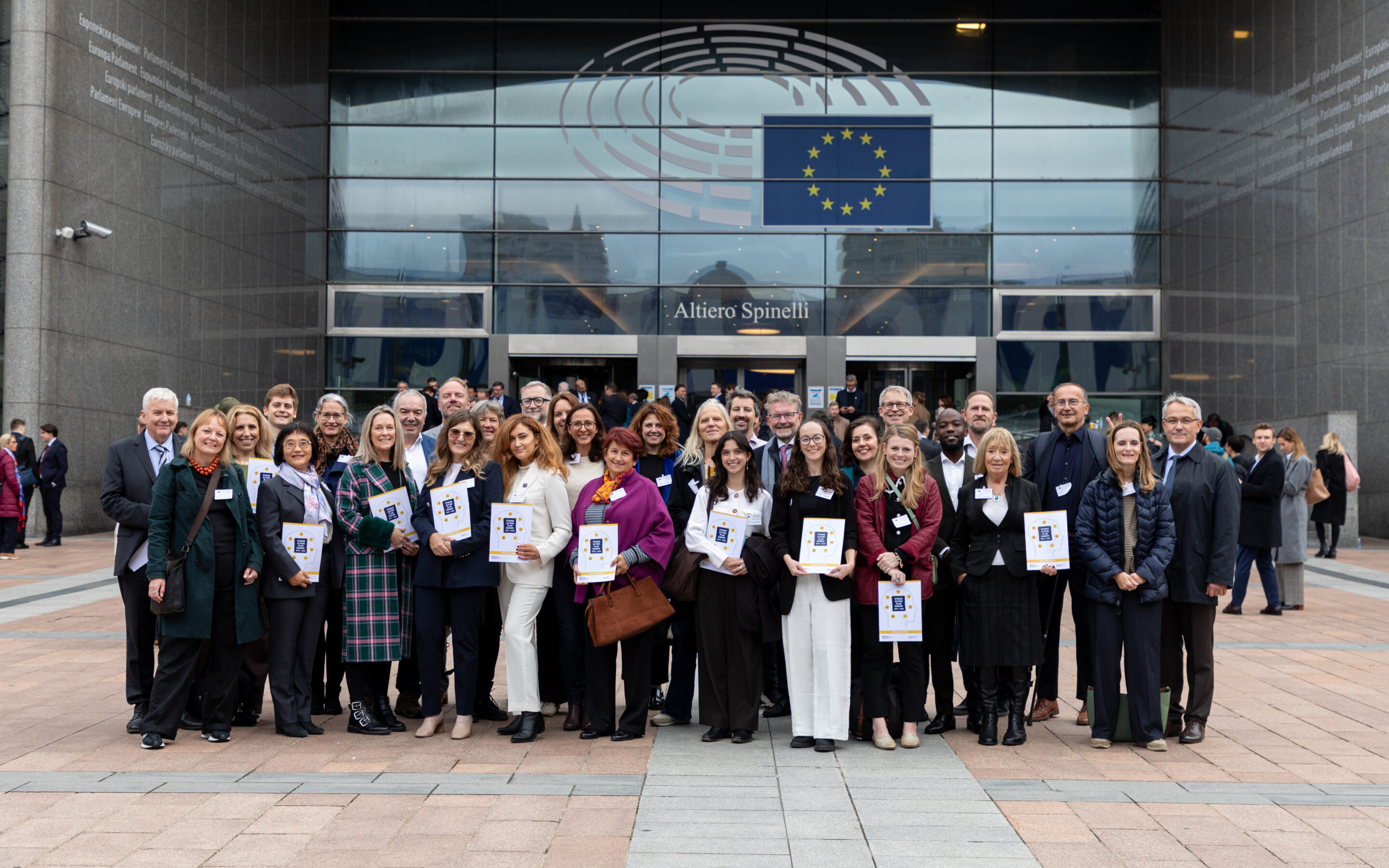
Oct 16, 2025
On Tuesday, stroke took centre stage at a European Parliament event in Brussels, where policymakers, people with lived experience, healthcare professionals, researchers, stroke support organisations and stroke advocates came together to call for urgent action to address lack of stroke research and persistent inequalities in stroke prevention, treatment and long-term care across Europe.
The recent World Health Organisation ‘Global status report on neurology’ highlights that stroke is the top neurological disorder contributing to health loss globally. Europe faces over 1.1 million strokes each year, causing nearly 460,000 deaths. Nearly 10 million people live with stroke’s long-term effects. The economic burden is immense and is projected to rise to €86 billion by 2040 without urgent reform. Stroke is the second leading cause of death and the leading cause of adult disability in Europe.
The event, “Closing the Gaps in Stroke Care: A Call to Action for Europe”, hosted by MEP Kelleher (Ireland) and MEP Jerkovic (Croatia), Stroke Alliance for Europe (SAFE) and the European Stroke Organisation (ESO), highlighted the critical need to act now and embed stroke as a key pillar into the upcoming EU Cardiovascular Health Plan and broader brain health strategies, and to use the Stroke Action Plan for Europe as the framework for this.
“Too many lives are cut short or permanently altered because access to prevention, acute treatment, rehabilitation and long-term support depends on where you live,” said Arlene Wilkie, Director General of SAFE, “With the upcoming publication of the Stroke Action Plan for Europe, we now have a clear roadmap. What we need is EU leadership to help Member States turn this evidence into action.”
The event featured contributions from Members of the European Parliament – Billy Kelleher (Ireland) and Romana Jerkovic (Croatia), Marianne Takki from DG Sante, Katherine de Bienassis from the Organisation for Economic Co-operation and Development (OECD), people with lived experience, ESO and SAFE.
Discussions underscored the urgent need for a coordinated European approach to closing the gaps in stroke care, supported by stronger alignment between EU and national health policies across five key areas:
- Prevention: Systematic screening for hypertension and atrial fibrillation, sharing best practices across Member States.
- Acute care: Expanding access to dedicated stroke units, emergency coordination and life-saving interventions such as thrombolysis and thrombectomy.
- Rehabilitation: Ensuring early, intensive, multidisciplinary rehabilitation with EU support for scaling up community and outpatient services.
- Life after stroke: Embedding long-term support, including mental health and reintegration programmes in national frameworks.
- Research and monitoring: Establishing EU-wide registries, quality indicators and embedding stroke in EU health and research agendas.
“As the EU prepares to shape its cardiovascular and brain health priorities, stroke must be recognised as a cornerstone issue,” said Professor Simona Sacco, ESO President, “This is the moment to move from fragmented efforts to a coordinated European approach.”
“I have lived experience of stroke, I know first-hand how life can change in an instant, and how much harder recovery could have become if support would have been fragmented or simply not there. Too many Europeans are left to navigate complex health systems on their own, facing barriers to rehabilitation, returning to work and rebuilding their lives”, said Associate Professor Melinda B Roaldsen, who is a medical doctor and stroke scientist with lived experience from Norway. “This event has given us a chance to change that. By asking MEPs and policy makers to bring stroke into the heart of EU health policy, they have an opportunity to make sure that every person, no matter where they live, has timely access to treatment, quality rehabilitation and long-term support. For me, this isn’t just about statistics or policy. It’s about dignity, independence and hope for millions of people and families across Europe.”
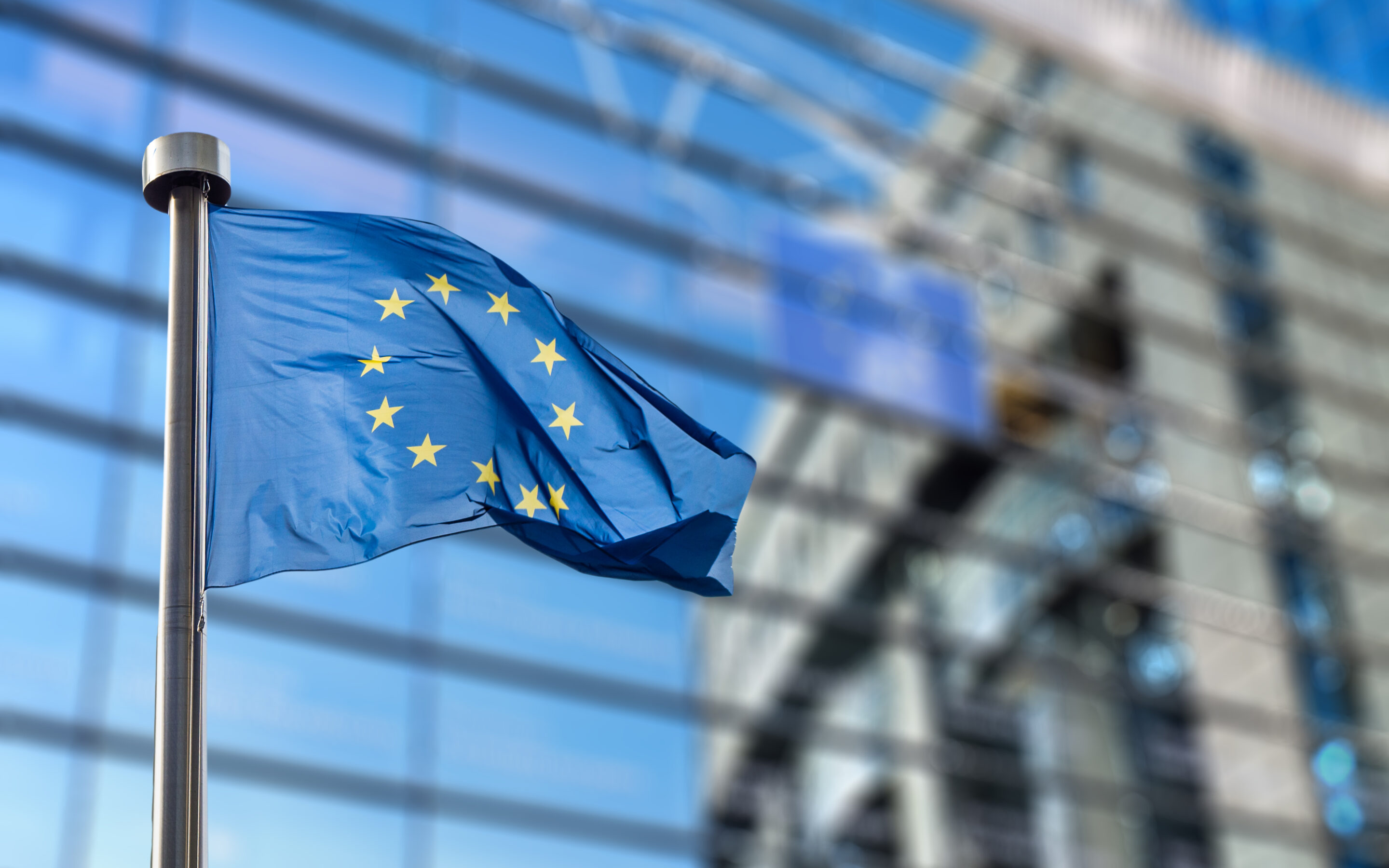
Sep 23, 2025
Stroke is Europe’s second biggest killer and the leading cause of acquired disability. Yet across the EU, stroke services remain fragmented and under-resourced, resulting in preventable deaths, lifelong disabilities, and a widespread lack of long-term support for survivors and their families.
On 14 October 2025, SAFE and the European Stroke Organisation (ESO) will host an event at the European Parliament in Brussels to highlight these systemic gaps and introduce the forthcoming Stroke Action Plan for Europe (SAP-E). This upcoming plan will outline evidence-based, cost-effective solutions designed to improve stroke care across Europe.
The event, Closing the Gaps in Stroke Care: A Call to Action for Europe, will bring together:
- EU and national policymakers
- Stroke survivors and caregivers
- Healthcare professionals and researchers
- Civil society and public health partners
The speakers at the event will outline ways to provide comprehensive stroke care across the entire care pathway, from prevention and emergency response to rehabilitation and long-term support, with a focus on better aligning EU-level initiatives and national implementation, including through the upcoming EU Cardiovascular Health Plan (CVH Plan).
By uniting lived experience, clinical expertise and policy leadership, the event aims to ensure stroke receives the attention it urgently requires within Europe’s health priorities and that updated SAP-E becomes a practical roadmap for meaningful, measurable change.
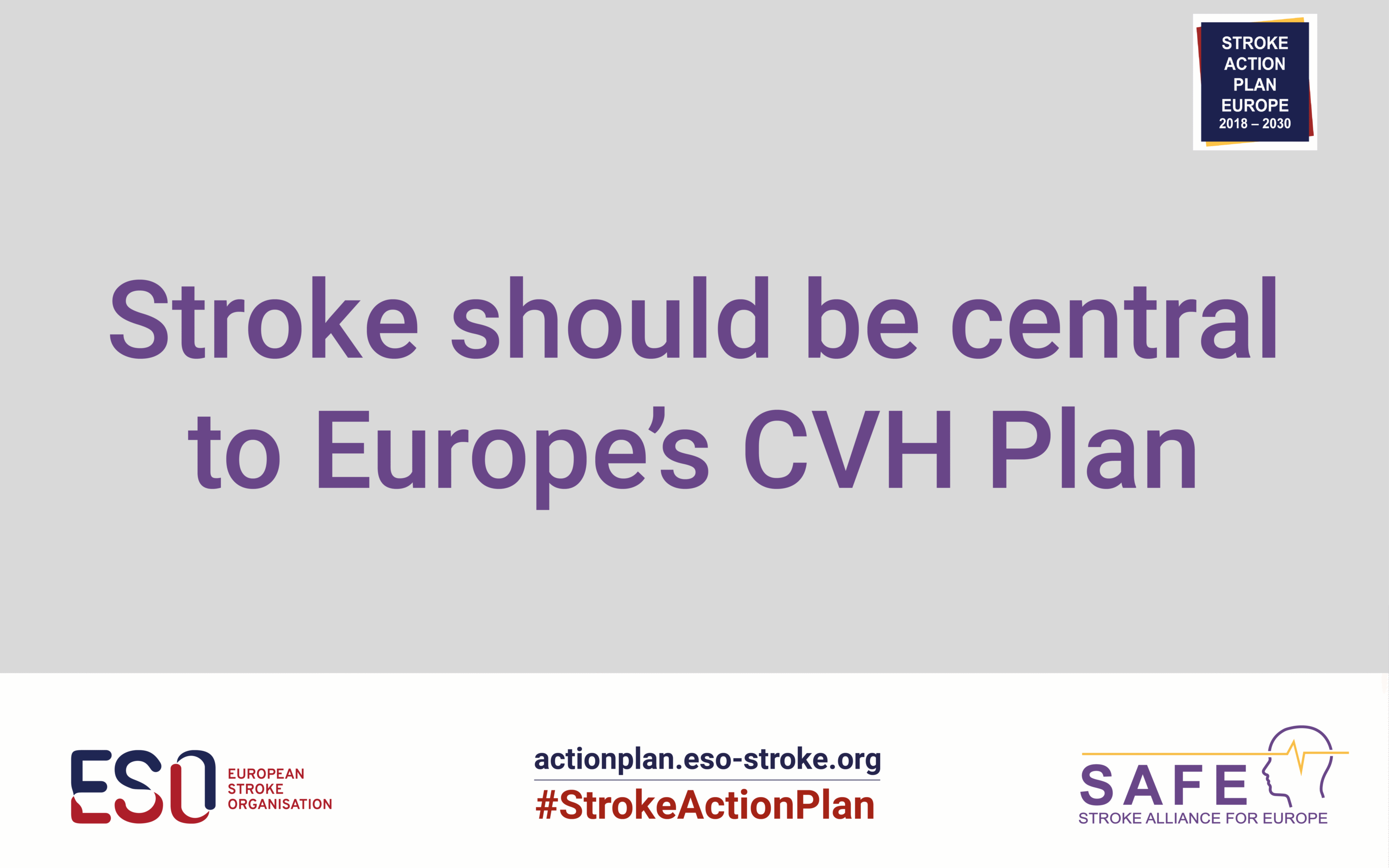
Sep 22, 2025
SAFE and the European Stroke Organisation (ESO) have jointly responded to the European Commission’s public consultation on the forthcoming EU Cardiovascular Health (CVH) Plan. With stroke being one of Europe’s leading causes of death and disability, we believe that it must be central to the EU’s strategy. Building on the Stroke Action Plan for Europe (SAP-E), we outline clear priorities to ensure that stroke is fully addressed within the EU CVH health plan to ensure that the people in the EU are supported at every stage, from prevention and acute care to recovery, research and life beyond.
Read the full consultation submission below:
The Stroke Alliance for Europe (SAFE) and the European Stroke Organisation (ESO) welcome the European Commission’s work on the EU Cardiovascular Health (CVH) Plan. We call on the Commission to place stroke, one of the most prevalent cardiovascular conditions, at the heart of the plan to ensure the EU achieves its objective of reducing its burden of cardiovascular disease (CVD).
As with all CVD, reduction in stroke are possible through preventive lifestyle interventions by legislative changes and fiscal policies (eg pollution and tobacco) and action on risk factors (eg hypertension, atrial fibrillation, diabetes and high cholesterol). Addressing these will reduce the impact and cost of stroke and all CVD. CVD prevention lowers stroke risk and quality stroke care reduces CVD recurrence. Stroke outcomes are improved when treated as an emergency and access is provided to specialised acute care, rehabilitation and long-term support.
Stroke is Europe’s 2nd biggest killer and the greatest cause of acquired long-term disability, responsible annually for 440,000 deaths and €60 billion in total costs. Yet prevention, acute care, rehabilitation, long-term support and research for stroke remain fragmented and under-resourced, leading to preventable deaths and disability. This perpetuates a sense of abandonment among survivors who face insufficient rehabilitation and community-based support. Investment in lifesaving interventions and research is essential and must go hand in hand with post-discharge services and support to ensure the lives saved are worth living.
Our Stroke Action Plan for Europe (SAP-E) highlights 7 priorities to fully embed stroke in the EU CVH Plan:
- Shared risk factors and primary prevention. Support actions to tackle the primary drivers of preventable CVD, promote systematic screening for hypertension and atrial fibrillation, and facilitate the exchange of best practices on opportunistic screening in primary care.
- Organisation of acute services. Recommend Member States (MS) ensure timely access to dedicated accredited stroke units, including EU-wide guidelines and benchmarks on stroke unit access and provided care, supported by coordinated emergency services and validated pre-hospital identification tools.
- Management of acute incidents. Promote faster access to life-saving interventions such as thrombolysis and thrombectomy by encouraging MS to set targets for maximum time between hospital arrival and treatment, connect smaller hospitals with specialist centres, and use EU funding to strengthen imaging and treatment capacity across regions.
- Secondary prevention and follow-up. Recommend MS create outpatient services targeting secondary prevention of stroke which are integrated into broader cardiovascular prevention policies and provide structured follow-up and rapid access to preventative drugs, surgical/device interventions and non-pharmacological secondary prevention/ lifestyle advice.
- Rehabilitation. Help restore independence and quality of life, by promoting minimum standards for early and intensive, multidisciplinary rehabilitation across MS, facilitate knowledge-sharing on effective pathways, and mobilise EU4Health funding to expand community and outpatient rehabilitation services.
- Life after stroke. Recommend MS integrate long-term support (including mental health, return-to-work, and social reintegration) into national frameworks, incorporating the role of patient organisations in support and advocacy.
- Evaluation, quality improvement and research. Propose EU-level stroke registries and performance indicators, foster systematic outcome monitoring across the stroke pathway, and embed stroke within CVD research agendas to advance prevention, acute treatment, rehabilitation and life after stroke.
Integrating stroke as a central issue in the EU CVH Plan will save lives, prevent disability and reduce costs. SAFE and ESO support these ambitions, including through our SAP-E, to ensure no one is left behind.
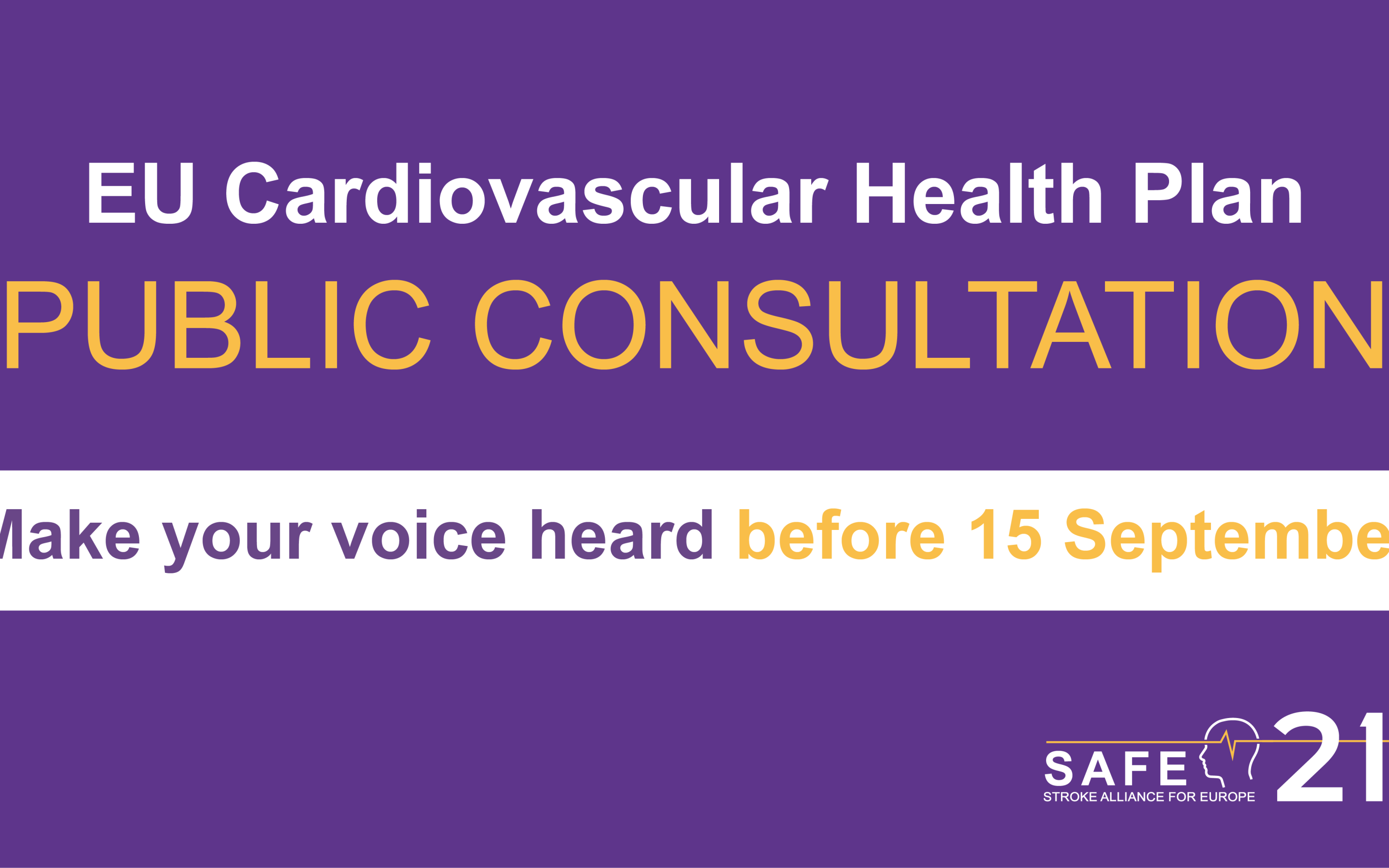
Aug 14, 2025
The European Commission has launched its public consultation on the EU Cardiovascular Health (CVH) Plan, and the deadline to respond is 15 September 2025.
This consultation is a critical opportunity to ensure that stroke, from prevention and acute care to rehabilitation and life after stroke, is fully integrated into the EU’s future cardiovascular strategy.
Why this matters
Cardiovascular diseases, including stroke, remain the leading cause of death and disability in Europe. The CVH Plan aims to:
- Prevent disease by addressing unhealthy behaviours and reducing risk factors
- Improve early detection and screening through EU-wide protocols, digital tools, and personalised treatment
- Enhance management, care, and rehabilitation, including non-medical long-term support for survivors
The plan will also explore the potential of emerging technologies, data-driven approaches, artificial intelligence and the European Health Data Space to create more predictive, personalised and equitable care.
How you can help
SAFE encourages its members, partners and the wider stroke community to respond to the consultation. Your input will help highlight the burden of stroke in your country and the urgent need for stronger EU action.
When submitting your feedback, you may wish to:
- Provide data and examples from your national context
- Suggest concrete actions and identify who should implement them
- Emphasise the importance of long-term, non-medical support for people affected by stroke
- Attach any relevant research or policy papers
Submit your feedback
To take part, click the button below and select ‘Give Feedback’
🗓 Deadline: 15 September 2025
Let’s make sure stroke is a central part of the EU’s vision for cardiovascular health.
Your voice matters.
Click for more information
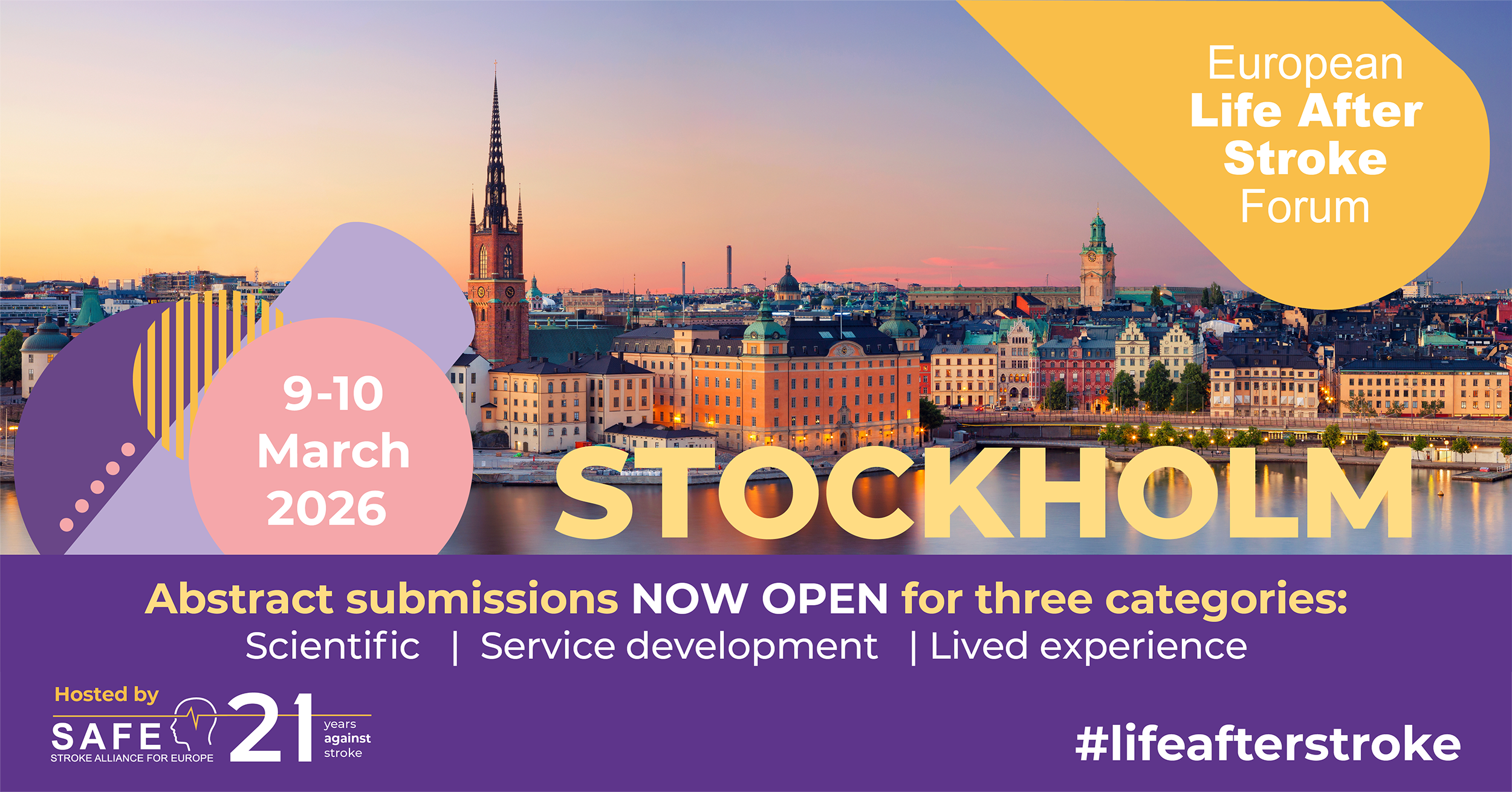
Jul 24, 2025
Our fourth in-person European Life After Stroke Forum in Stockholm provides an opportunity to contribute to this important research space. We are actively seeking abstracts across three categories:
- Scientific – for completed or ongoing research focussed on life after stroke.
- Service development – for innovative service developments in life after stroke that could benefit others.
- Lived experience – for people who have experienced a stroke or those who have supported a loved one through it to share their experiences in creating change.
Join an international community of experts, practitioners and people with lived experience, all working to advance stroke recovery and best practice.
Deadlines
Lived Experience – 8 August 2025
Scientific & Service Development – 7 October 2025

Jul 3, 2025
Join Global Leaders in Stroke Care at WSC 2025 in Barcelona
The World Stroke Congress (WSC) 2025, set to take place on October 22-24, 2025, in the vibrant city of Barcelona, marks a significant milestone for the stroke community.
For the first time in over 15 years, the congress will return to Europe, providing an opportunity to advance the global conversation on stroke prevention, treatment and rehabilitation.
This historic event brings together leading professionals, researchers, clinicians, policymakers and individuals with lived experience to collaborate on shaping the future of stroke care.
A Platform for Global Collaboration and Innovation
WSC 2025 offer a program designed to immerse attendees in the latest scientific breakthroughs and the most pressing issues in stroke research and treatment. From the frontlines of innovation to cutting-edge science, the congress feature a range of topics including:
- Intracranial Atherosclerotic Disease (ICAD)
- Large Artery Disease
- Cardioembolism
- Cerebral Venous Sinus Thrombosis (CVST)
- Stroke in the Young
- Rehabilitation and Recovery
- Embolic Stroke of Undetermined Source (ESUS)
- Revolutionary Research Methods
- Hyperacute Stroke Treatment Advances
- Neuroimaging Innovations & Intracranial Hemorrhage Management
This year, WSC 2025 has crafted its program based on a deep dive into the most impactful research and groundbreaking publications from leading stroke and neurology journals. Attendees will gain exclusive access to insights and discoveries directly from those shaping the future of stroke care.
Building a Global Movement for Stroke Care
WSC 2025 is an opportunity to engage with trailblazers in the field, discuss current challenges and solutions, and be part of a global movement to transform stroke prevention and treatment.
The congress will place a strong emphasis on global collaboration, advocacy, diversity, equity and inclusion, ensuring that stroke care continues to improve worldwide. One of the key focuses will be providing opportunities for early career investigators to network, receive mentorship and further their professional development in the field of stroke research and clinical practice.
The program for WSC 2025 is now available, and early bird registration is open! Attendees who register by August 5, 2025, can take advantage of special early bird rates.
Register today and be part of this historic event in the fight against stroke: https://worldstrokecongress.org/registration
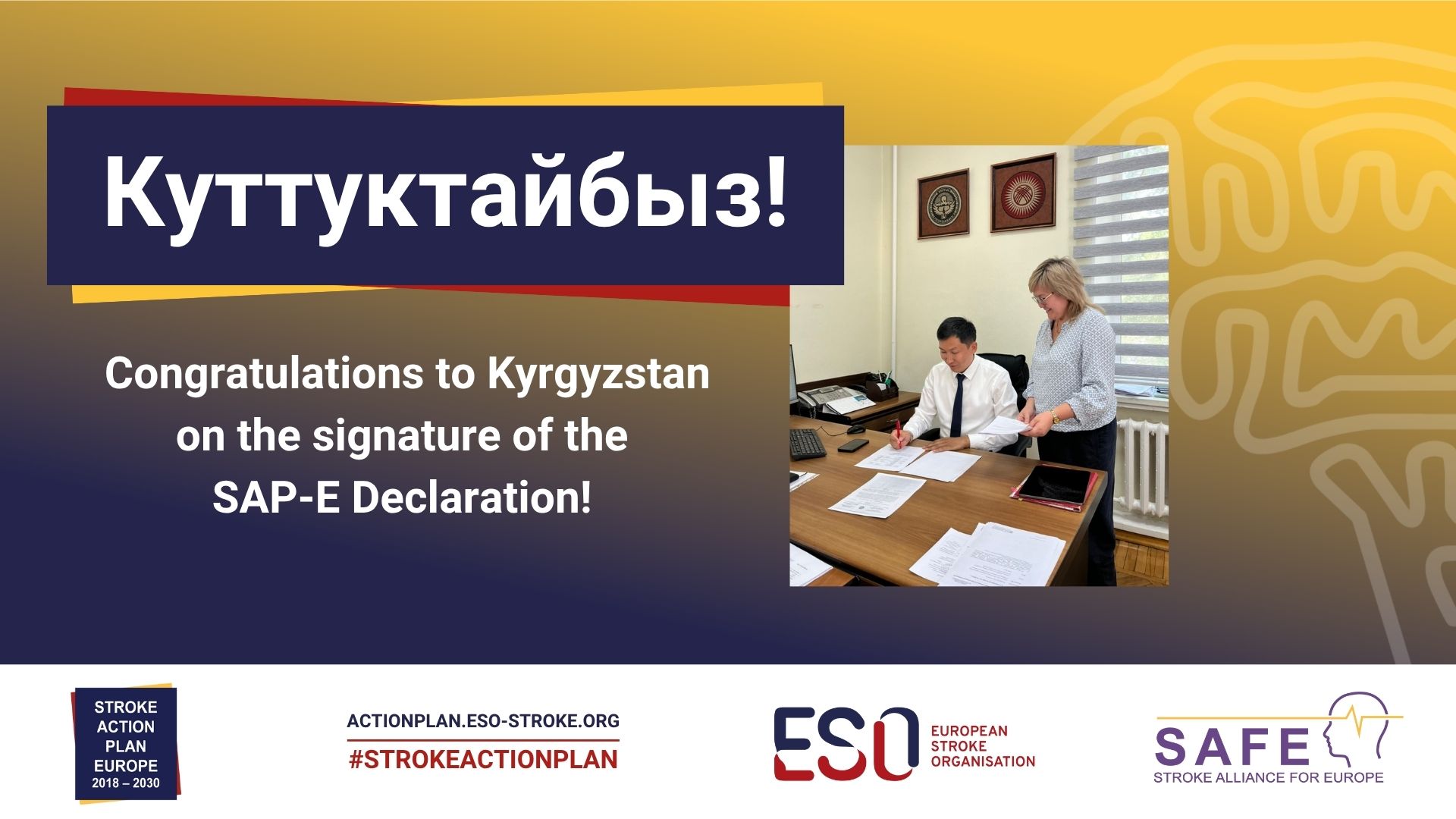
Jul 1, 2025
Congratulations!
Kyrgyzstan is now the 15th country to endorse the Declaration for Action on Stroke, marking a significant step towards improving stroke care, prevention and recovery services for its population.
By signing this declaration, Kyrgyzstan’s government demonstrates its commitment to recognising stroke and other cerebrovascular diseases as leading causes of premature death, long-term disability and cognitive decline among adults. The declaration emphasises that many strokes are both preventable and treatable through evidence-based, cost-effective interventions.
With this endorsement, Kyrgyzstan pledges to fully support the implementation of the Stroke Action Plan for Europe, aligning with its four key targets for 2030 and the broader goals of the WHO Global Action Plan for the Prevention and Control of Noncommunicable Diseases.
Read more here.

Jun 20, 2025
We are pleased to announce that the fourth in-person European Life After Stroke Forum will take place in Stockholm on 9-10 March 2026.
The Forum is a unique event where healthcare professionals, researchers, policymakers and those affected by stroke can come together to address the issues of life after stroke. Our programme will be filled with the latest research, best practice and shared insights with the voices of people with lived experience at its heart.
We are actively seeking abstracts in three categories:
- Scientific – for completed or ongoing research focussed on life after stroke.
- Service development – for innovative service developments in life after stroke that could benefit others.
- Lived experience – for people who have experienced a stroke or those who have supported a loved one through it to share their experiences in creating change.
For more information or to submit an abstract, please click to visit our website.

May 21, 2025
Thank you to all those that came to the European Life After Stroke Forum in Prague on the 10-11 March. We are delighted to have so many of the European Stroke Community come together to continue to improve Life After Stroke. If you were not able to join us in Prague or would like to re-visit the best moments, we have included the links to the post-event materials that are available on our website below.
Click to view event slides
Click to view programme
Click to view scientific and service development abstract book
Click to view lived experience abstract book
Click to view forum report
Click to view photo gallery
Page 1 of 8012345...102030...»Last »




















